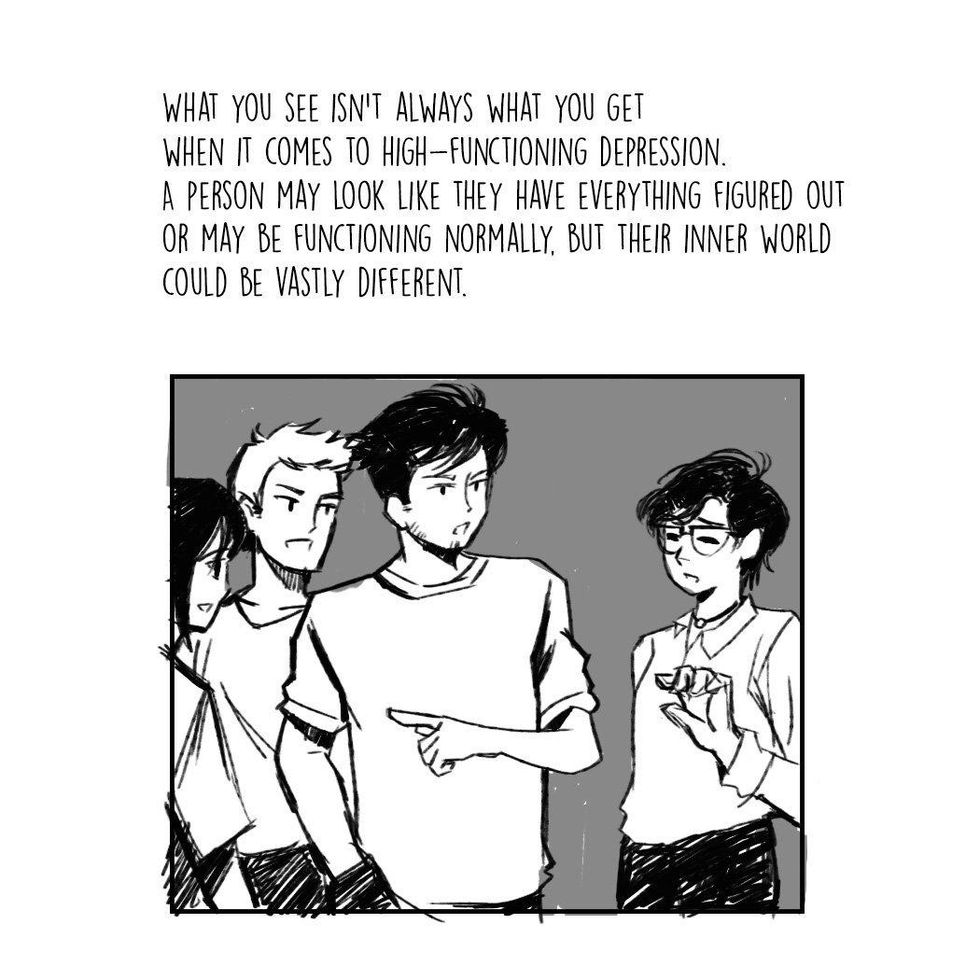News
Darin Graham
Jan 26, 2018

Picture:
Pauline Palita/Twitter
An artist shared a series of tweets and drawings explaining why people with mental health problems may suffer from tiredness and her thread went viral.
Pauline Palita a 23-year-old advocate for mental health from the Philippines, was diagnosed with bipolar at 19. She decided to start the thread because she was tired of being misunderstood and wanted to raise awareness about depression.
She explained that when people ask her if she’s okay, she usually replies with “I’m fine, just tired,” and adds that for her, being tired is a “fact of life.”
Speaking to indy100 Pauline said:
I'm really tired of people who simply don't understand and don't care to understand. So I decided to explain how it really feels like detail by detail. I decided to be the voice and to stand up because I know there's a lot of people out there fighting the same silent battles I'm facing.
I know how hard it is to deal with this kind of illness, the feeling of not taking your condition seriously and I know a lot of people out there who don't have the ability to speak about it the only thing I can do is spread and raise awareness so maybe just one day the stigma around mental illnesses ends.
Pauline’s feed explored how some people constantly battle their own mind and may not wake up feeling as refreshed as the average person. She said it’s like “a battery that has been damaged that never seems to recharge properly.”
Other things pointed out by Pauline included memory issues, the effort needed to focus on tasks during the day, and “sensory overload” - as people try to deal with society's expectations of them.

Pauline said she usually illustrates when she is in a depressive episode as a way to cope with her mental health.
People on Twitter couldn’t thank her enough for raising some of these issues in her thread.
User @aqilahsulaiman said, she, like many others:
...would like to thank you [Pauline] for so eloquently describing what living with mental illness feels like. I have always found it quite difficult to put my experience into words but you’ve done it. Thank you.
Here are a few of the other responses:
Pauline, who is very overwhelmed with the response, never thought it would spread and go viral. She said:
But I'm happy it did so a lot of people can read it and educate themselves and share awareness too. I'm also happy to hear their stories. It made me realise that I'm doing a great job.
The relationship between sleep and mental health
There is a close relationship between sleep and mental health, mental health charity Mind said on its website.
Living with a mental health problem can affect how well you sleep, and poor sleep can have a negative impact on your mental health.
The charity added that a sleep problem can lead to more negative thoughts and feelings of depression, anxiety, loneliness, and isolation. It says that although the situation is different for everyone, some things people can try to help is to establish a routine, relax before bed, sleep where you are most comfortable and look at your diet and exercise routines
Speaking to indy100, mental health campaigner Jonny Benjamin said Pauline's feed was really interesting. He added:
When I was first diagnosed with schizoaffective disorder I always felt tired.
I’m not sure if it was the exhaustion of living with the illness or the medication.
I’ve had problems with sleep and fatigue since then but the number one tip I have is not to beat yourself up due to your tiredness.
Easier said than done I know of course!
If I feel tired and overwhelmed I’ll listen to a self compassion meditation which generally seems to help.
Using natural oils like lavender, watching something on TV that makes me laugh or having a hot, relaxing bath are also forms of self care that help to relax and distract me from my fatigue.
Jonny vlogs about his experiences in coping with mental illness on his YouTube channel, you can find out more here. .
You can find out more about Pauline Palita's work on her Facebook page.
HT Boredpanda
If you are feeling vulnerable, upset or depressed there is always someone available to talk and help.
You can contact the Samaritans 24-hours a day for free via their website or phone line 116123
If you're LGBTQI and in need of someone to talk to, Switchboard LGBT offer advice and help every day from 10am to 10pm on their website and on 0300 330 0630
Alternatively, if you suspect a young person might need help, you can call Childline for help and advice on 0800 111
More: This artist uses paper clips to illustrate mental health issues
Top 100
The Conversation (0)













